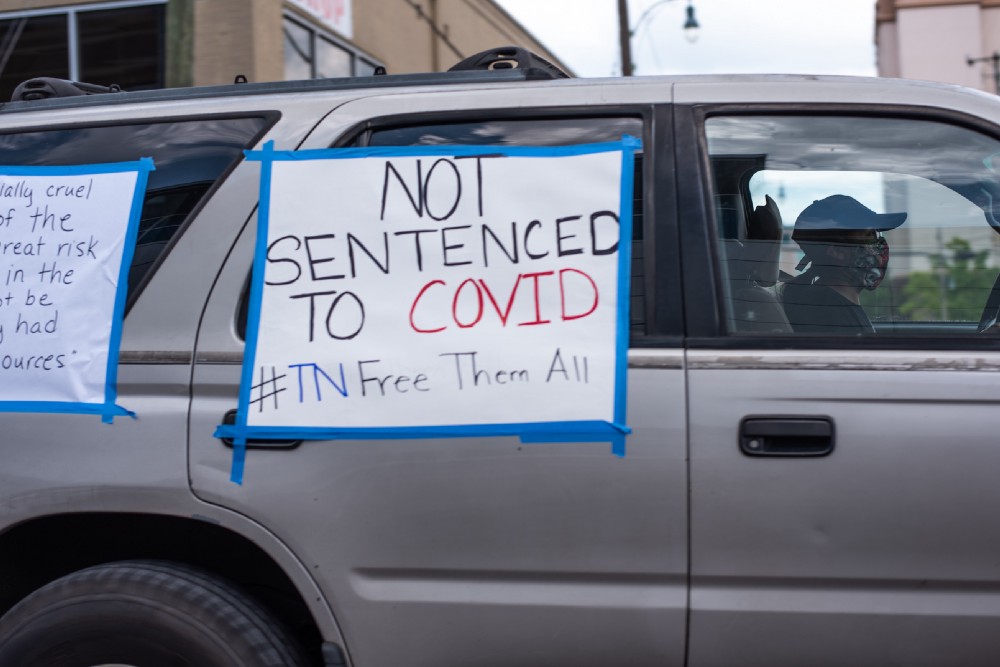Feature image: A rolling protest outside outside of the Shelby County Criminal Justice Center May 21 called for the release of people held at the Shelby County Jail. On May 20, the ACLU, Just City and local attorneys sued the Shelby County Sheriff’s Office for failing to protect detainees from COVID-19 exposure. Photo by Johnathan Martin.
Friday’s federal court hearing is the latest development in lawsuit against the Shelby County Sheriff’s Office.
By F. Amanda Tugade and Wendi C. Thomas, for MLK50
As proof that crowded conditions at the Shelby County Jail put detainees at risk of catching coronavirus, Russell Leaks brought to federal court Friday his sketch of the pod where he’s been held since December.
In a space Leaks said was designed to hold 50 people, bunk beds are only two feet apart. Detainees must be seated during meals, he testified, but in the lunchroom they sat five to a table — far closer than the Centers for Disease Control and Prevention’s recommendations to stay six feet apart.
“I feel afraid for my life. There’s not enough being done here to keep me safe,” said Leaks, 65, who has high blood pressure and hepatitis C.
Friday’s hearing was the latest development in the lawsuit filed in May against the Shelby County Sheriff’s Office by the ACLU, Just City and two local attorneys.
The suit, filed on behalf of current and future detainees, claims the department’s failure to protect those in custody from the coronavirus violates detainees’ Fourteenth Amendment or due process rights. That constitutional right, the suit argues, requires corrections officials “to provide for the reasonable health and safety of persons in pre-trial custody.”
The suit demands the release of medically vulnerable detainees such as Leaks, who testified that he has had a heart attack. According to the CDC, people with underlying medical illnesses — including chronic lung disease, a serious heart condition or weakened immune system — are at a higher risk for COVID-19.
Those who are at a higher risk should be moved to hospitals, halfway houses or alternative programs where they can practice social distancing, the suit said.
Just over 170 detainees and 107 jail employees have tested positive for the virus, the sheriff’s office tweeted Friday. One employee who tested positive died, according to the Shelby County Health Department.
Leaks, who is being held on a parole violation, testified he’d seen few changes since the pandemic began in March.
Posters in his pod list tips to slow the spread of COVID-19, he said, but some detainees can’t read.
A few soap dispensers were added to the restrooms, Leaks said, but were often empty, and now, one is broken.
He has only received three face masks, he said, including the one he wore during the virtual hearing.
On Wednesday, the state reported 2,472 cases, setting a new record for the highest single-day increase. On Friday, the Tennessee State Health Department reported 1,955 new COVID-19 cases, bringing the total to 59,546. The death toll now stands at 723.
Also on the stand Friday was Robert Harold Pigram, who has also been in jail since December. He has sickle cell anemia, he testified, and also tested positive for COVID-19.
“I’m very in fear of my life,” said Pigram, 51. “People are very sick in here, and everybody needs to know that.”
Both Leaks and Pigram are Black, and according to the CDC, African Americans are five times more likely to be hospitalized for or die from COVID-19. In Shelby County, African Americans account for 57% of COVID-19 cases and 62% of deaths.
The hearing resumes at 9:30 a.m. Monday before federal court judge Sheryl Lipman. Defense witnesses scheduled to appear include Shelby County District Attorney General Amy Weirich and Kirk Fields, a chief jailer at Shelby County Jail.
F. Amanda Tugade is a corps member with Report for America, a national service program that places journalists in local newsrooms.
This story is brought to you by MLK50: Justice Through Journalism, a nonprofit newsroom focused on poverty, power and policy in Memphis. Support independent journalism by making a tax-deductible donation today. MLK50 is also supported by the Surdna Foundation, the Racial Equity in Journalism Fund at Borealis Philanthropy, Southern Documentary Project at the Center for the Study of Southern Culture, the American Journalism Project, the Community Foundation of Greater Memphis, and Community Change.

